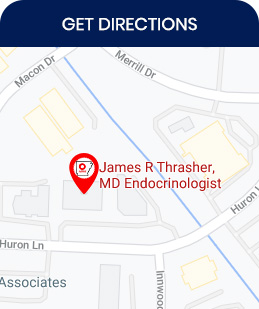Pituitary Disorders Treatment Specialist in Little Rock AR
Damage to the pituitary gland can impact important bodily functions such as growth, thyroid function, adrenal function, and reproductive processes. The treatment of pituitary disorders at facilities like Arkansas Diabetes and Endocrinology Center is tailored to the specific needs of each patient, considering the nature and severity of their condition. For more information, contact us our office to schedule an appointment. We are conveniently located at 11400 Huron Lane, Little Rock, AR 72211.


Table of Contents:
What are the symptoms of a damaged pituitary gland?
How do you diagnose pituitary disease?
How are pituitary disorders treated?
A damaged pituitary gland, located at the base of the brain, is usually the result of head trauma, brain surgery, radiation, non-cancerous tumors, or loss of blood supply (Sheehan’s Syndrome). The damage is most commonly seen on a head MRI or CT scan. A damaged pituitary gland can lead to a variety of symptoms. This small gland is responsible for producing several hormones, which in turn stimulate the production of other hormones throughout the body.
The pituitary gland influences important bodily functions such as growth, thyroid function, adrenal function, and reproductive processes. As a result, when it’s damaged, the effects can be widespread.
The symptoms that arise from a damaged pituitary gland depend on which hormones are affected and to what extent their production is altered. For instance, deficiencies or imbalances in these hormones can lead to gradual but significant changes in the body. These changes might include fatigue, alterations in body fat and muscle strength, difficulties in sleeping, and issues related to sexual function.
Additionally, individuals might experience changes in bowel movements, nausea, vomiting, and abdominal pain. The impact of a damaged pituitary gland can also extend to an individual’s mental health, potentially leading to conditions like depression or anxiety.
The gradual onset of these symptoms can take months or even years to fully develop, making it crucial for individuals to pay attention to their bodies and seek medical advice if these symptoms persist.
At places like Arkansas Diabetes and Endocrinology Center, specialists are equipped to handle such complex symptoms and provide appropriate care.
Diagnosing pituitary disease involves a comprehensive process that begins with a detailed review of the patient’s symptoms, medical history, and any medications they are currently taking.
At specialized centers like Arkansas Diabetes and Endocrinology Center, experienced specialists conduct a thorough physical examination, which is often followed by various diagnostic tests. These tests may include blood work, MRI scans, eye examinations, and potentially more, depending on the individual’s symptoms and health history.
Blood tests are crucial in diagnosing pituitary disease as they can reveal whether the body is producing the correct amounts of hormones. For example, a deficiency or excess in certain hormones can be a clear indicator of pituitary dysfunction.
Urine tests are also used to check for hormone levels, particularly when assessing the presence of hormones like ACTH, which can lead to an overproduction of cortisol. Imaging tests like CT scans and MRIs are instrumental in identifying and characterizing pituitary tumors and assessing their size and location, which is critical for planning any necessary surgical interventions. MRI’s are the primary imaging used for the pituitary gland.
Eye exams are also an important diagnostic tool, as pituitary diseases can sometimes affect eyesight. Due to the slow progression of pituitary diseases and their symptoms often resembling other health conditions, it’s vital to have an expert evaluation to confirm the diagnosis.
The treatment of pituitary disorders at facilities like Arkansas Diabetes and Endocrinology Center are tailored to the specific needs of each patient, considering the nature and severity of their condition.
The range of pituitary disorders is diverse, including conditions like pituitary tumors, acromegaly, diabetes insipidus, and empty sella syndrome, each requiring different treatment approaches. The goal of treatment is to address more than just the symptoms; it aims to tackle the underlying causes of the disorder for long-term health improvements.
Treatment options may include hormone replacement therapy and medication to manage hormonal imbalances or deficiencies. In cases where tumors or abnormal tissue growth are present, surgical intervention might be necessary.
These surgeries aim to remove or reduce the size of the tumor or abnormal tissue, thereby alleviating symptoms and restoring normal gland function. The treatment approach is comprehensive and multidisciplinary, involving a team of specialists who work together to provide the best possible care for each patient.
This approach ensures not only immediate relief from symptoms but also focuses on long-term resolutions of the underlying issues, enhancing the overall health and well-being of patients with pituitary disorders.
Pituitary disorder treatment is available at Arkansas Diabetes and Endocrinology Center. Visit us online today for directions to our leading healthcare clinic! We serve patients in a wide variety of areas across the state, and we are here to help always keep your health in check. Today (please note that UnitedHealthcare no longer covers telemedicine appointments.). If the commute is too far away for you and your family, then learn more about our telehealth services today! Our clinic is located in Little Rock, AR but we serve patients from Conway AR, North Little Rock AR, Pine Bluff AR, Hot Springs AR, Benton AR, Sherwood AR, Russellville AR, Jacksonville AR, Cabot AR, Searcy AR, Bryant AR, Jonesboro AR, Forrest City AR, Magnolia AR, Camden AR, Malvern AR, Batesville AR, Arkadelphia AR, Clarksville AR, Monticello AR, Heber Springs AR, Morrilton AR, Stuttgart AR, Greenbrier AR, Sheridan AR and Vilonia AR.







